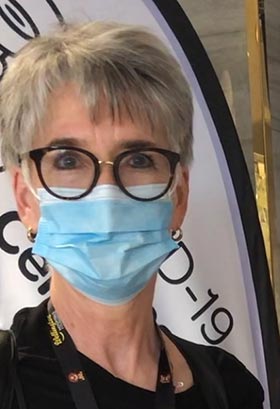“We are the best advertisement for the vaccine, as we have all had it,” said Habowska. “Just like a cook eats their food, it’s a good vote of confidence.”
The team of 13 nurses has vaccinated around 480 border workers – from stevedores to security personnel to hotel housekeepers – at Wellington’s port, airport and managed isolation or quarantine (MIQ) facilities since mid-February.
Community education

Conversations with these people made her realise the key role nurses play in community education. “It’s really important to be clear why it’s safe, why they can tell their families it’s safe and about the clinical trials. They can take that message home – our safety is only as great as the uptake in the community… If they can’t be confident then we don’t get that herd protection – and we want the vulnerable to be protected.”
Most were “happy and relieved” to be vaccinated, and for the hesitant few, nurses were mostly able to reassure them.
About 95 per cent of all border and port workers would have had both vaccinations by Easter weekend, she said.
Vaccinators had been working up to 10-hour days and at weekends to get the border workforce vaccinated. “It’s high priority and we need to get it done, so Capital & Coast District Health Board [DHB] can get its resources into our own health staff [who are next in line].”
Watching the rapid spread of COVID-19 in previously disease-free nations such as Tahiti, New Caledonia, and the Wallis and Futuna islands was a sobering reminder of the importance of her work.
Habowska said the logistical challenges of handling a vaccine requiring ultra-cold storage “spins your head”. But the DHB had thrown its resources behind the immunisation team, with “hundreds” of people organising things behind the scenes. “It’s like a military operation – and it all does run like clockwork.”
According to the Ministry of Health website, the next phase was border workers’ households, which would be run by primary health organisations, then “high-risk, frontline health-care workers”.
Habowska was planning a “bit of a rest”, before taking up a new role as a nurse educator at Wellington’s MIQs.




